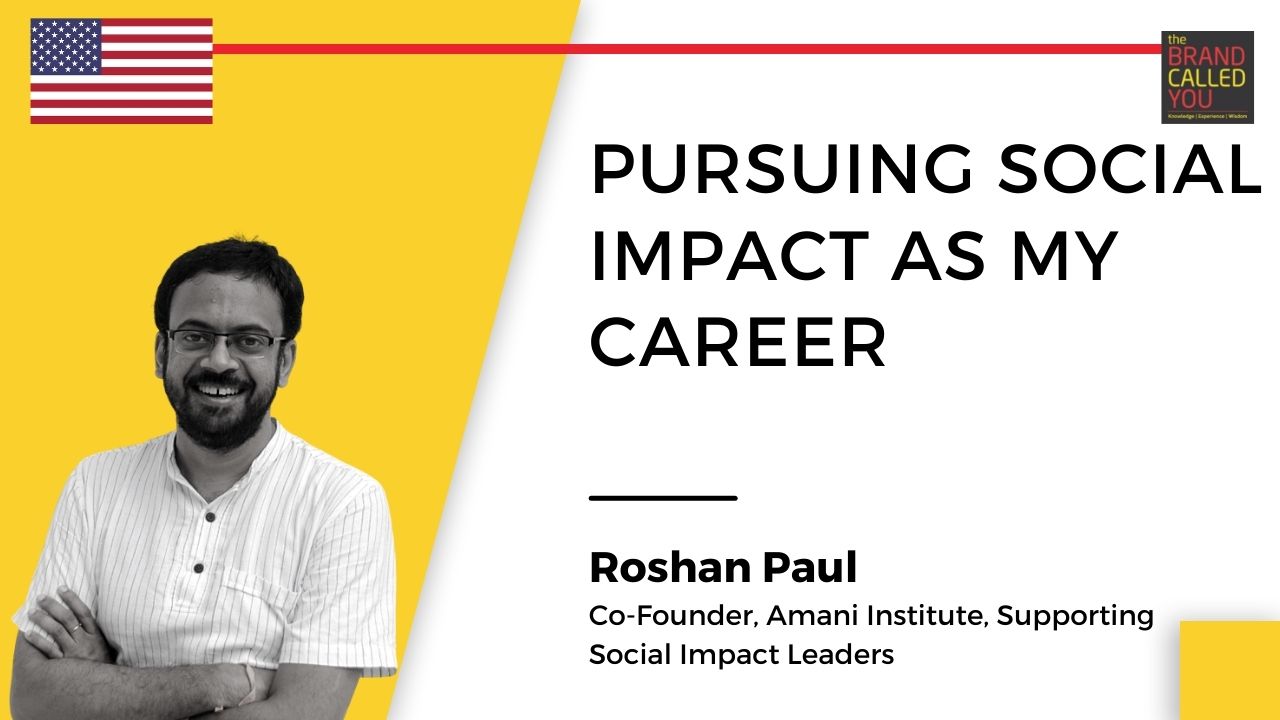Roshan Paul, Co-Founder, Amani Institute, Supporting Social Impact Leaders
Roshan Paul has spent his life questioning the status quo and built a career around connecting global citizens to solve social problems across boundaries.
Podcast
Overview
There are people who want to work for society, there are people who work for society, then there are people who help others in working for society.
One such personality is with us today on our show who has made ‘Social Impact’ his career. We are pleased to invite Mr. Roshan Paul as our guest for this episode of The Brand Called You.
Roshan is a social entrepreneur and the co-founder of the Amani Institute which is supporting social impact leaders. He has been awarded and felicitated several times. He is also an author who has written books like ‘Such a lot of World’, ‘Your Work begins at No’ and ‘The New Reason to Work’.
Amani Institute
Amani Institute was co-founded by Roshan eleven years ago with the purpose of helping those who wanted to make a social impact with their careers. He tells us that all around the world, many people want to make a difference in society with their careers. He says that today, people are not just about making money, they in fact are more purpose-driven. They want to make an impact but do not know how to do it, that’s where Amani Institute steps in and helps them in developing their meaningful careers.
Amani Institute is currently working in all seven continents.
Projects run by Amani Institute
Roshan tells us that their Postgraduate Certificate in Social Innovation Management is quite popular. It is open to everyone irrespective of their academic background.
The second program Roshan talks about is their program for small businesses. He tells us that the biggest constraint for the growth of small businesses in the Middle Management Talent and if that potential is unlocked, it accelerates their growth, which eventually helps the economy to grow.
Apart from that Amani Institute also works as a consultant company for various things like in-house capacity building, training the staff of various non-profit organizations, etc.
Identifying the value of Social Impact
Roshan was born and brought up in India. He moved to the US for his college. While he was in his final year of college, America was attacked by terrorists. In the same academic year, the Indian parliament was also attacked by terrorists and both the attacks were followed by several riots. Roshan tells us that he felt like both the countries he knew best were in chaos. At that time, he turned down a prestigious corporate job, moved to India, and started working for a low-salary non-profit organization job because he wanted to make a social impact. He tells us people were unsupportive of his decision, but he stood his ground firm and kept working for society. After a decade, as he was working as a social entrepreneur, the same people who earlier mocked him, now wanted to work with him.
How does the culture impact ‘impact’?
In Roshan’s opinion, working for social impact is different in different countries. It is highly affected by the role of the government of that country. Roshan tells us that in the US people want as little government as possible. They believe in a very individually driven culture. They don’t believe in paying much taxes to the government, instead, they invest in foundations and charities, which is why the US is the most giving state of the world. On the contrary, European countries believe strongly in their government and pay high taxes. They believe that the government does all the work of society and this is why there are fewer people engaged in the social impact work in Europe. However, there are now more and more people understanding the value of Social Impact and are contributing towards it.
How is technology making a difference in social impact?
Roshan says that technology is dramatically changing social impact and at the same time not changing at all. He explains that technology is changing social impact to the level it is changing all of our lives in general. Technology has certainly provided new platforms and tools to the world and organizations are trying to use those tools to drive their social impact missions. But at the end of the day, social impact is about changing human behavior. Technology can be a contributing factor but the major part is done by humans in making a change.


